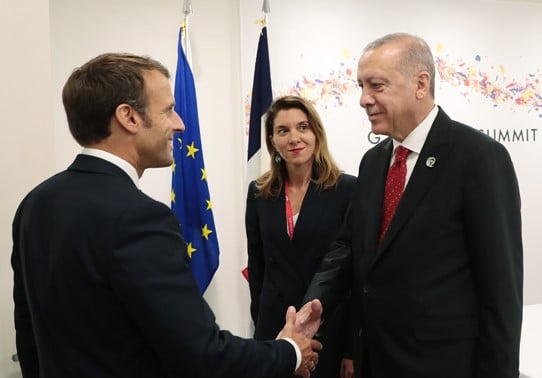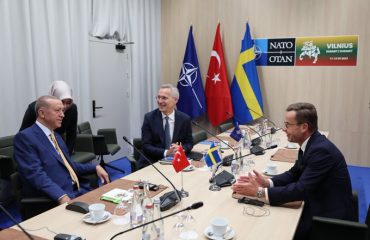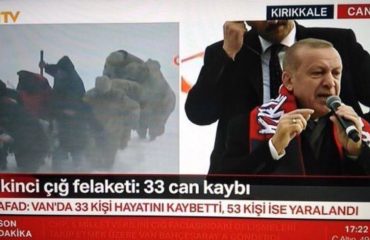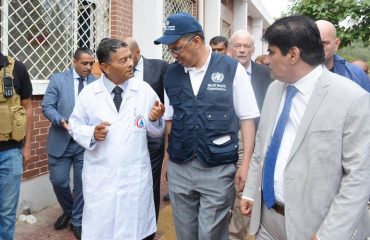

Let me fix the headline first since I should have said “politicians like Emannuel Macron.” However, it is the French leader who challenges Turkish President Tayyip Erdoğan today, so this article focuses on him.
Though it is a little late, Germans know today that confrontation is political nutrition for Erdoğan. First, President Frank-Walter Steinmeier, then Chancellor Angela Merkel practiced that targeting Erdoğan in person simply empowers him, and it also pushes Turkey away from Europe. But, the same Germany, which spent taxpayers’ money to save Greece from bankruptcy in 2008, now has to watch Greece pour billions of euros –still with the taxpayer’s money– into French weapons. And this is all because of France’s insistence on clinging to the Eastern Mediterranean, a region where it does have any coasts or historical ties, via Cyprus, after its Lebanon project failed. Kyriakos Mitsotakis may see harm from this move in the long run.
Germany has understood that targeting Erdoğan in person does not yield any results other than making anti-Turkey lobbies in the country happy. But France is taking the opposite road.
Macron, who thinks that targetting Erdogan will bring him popularity, does not listen to first-class Turkey-expert diplomats. This is what the two leaders have in common since Erdoğan is also not giving an ear to the France-expert or EU-expert diplomats.
Erdoğan’s favorite issue
However, neither Macron is Napoleon Bonaparte who took Egypt from the hands of the Ottomans, nor Erdoğan is the Ottoman Sultan Selim I who took over who took the caliphate from Egypt by the sword. Ankara is right when it says “France is provoking Greece against us”. There is no room for a heroic story from here for anyone.
Still, thanks to Macron’s Eastern Mediterranean campaign to ease France’s economic woes by selling arms to Greece and to sweep his Lebanon fiasco under the carpet, Erdoğan has found a perfect distraction to replace Turkey’s hot issues on the agenda.
Most recently, he said “You will have more problems with me”, challenging Macron at a party meeting he held by postponing the bans that should be imposed against Covid-19, which is getting more and more grave. The purpose is clear. Macron will most probably not be able to avoid responding to Erdoğan, as the Turkish president will stick to his role as the leader who challenges the West in the eyes of his electoral base in the country and the peoples of the Middle Eastern countries who are sick of their despotic governments. This issue may even overshadow the debate over Erdoğan’s move not to extend the Mediterranean mission of the Oruç Reis, the oil and gas drilling ship that returned to the harbor after the intervention of the U.S. “If you were going to back down, why did you strain the relations that far?” the opposition has already started asking.
Issues not spoken of
Again thanks to Macron, Turkish media outlets, most of which are controlled by the companies that also have been winning the tenders for state projects, can find a way to remain blind to Turkey’s urgent internal problem
The Covid-19 epidemic, which is thought to have been taken under control in April and May, has exploded again and Erdoğan’s most outstanding solution is to call on citizens to wear masks and stay away from each other. He is on the same page with Macron on this issue too, since the situation of the pandemic in France is not different than the situation in Turkey.
Credit rating agency Moody’s last week announced Turkey’s ratings and they were even worse than the ratings during the 2001 financial crisis. Even according to data by TÜİK, Turkey’s state-run statistical institute that is questioned by many citizens, some 20 percent of the population owns 50 percent of the national income. The Turkish Lira is trading at a historically low level, around 7.5 per dollar and 8.8 per euro. The purchasing power o the citizens in free fall. Due to a ban on layoffs as part of measures against the Covid-19 epidemic, we are not aware of the real unemployment figures.
To observe the situation of the judiciary, one does not have to study the cases of politician Selahattin Demirtaş, businessman and activist Osman Kavala, or journalist Müyesser Yıldız. Since Erdoğan became both President and chairman of the ruling Justice and Development Party (AKP) in June 2018, some 36,000 people have been investigated for insulting the President, mostly for words that could normally be considered political criticism; and some 3,800 of the 12.000 people who appeared before a judge have been sentenced.
Nowadays Macron is like medicine to Erdoğan in the face of this picture.


